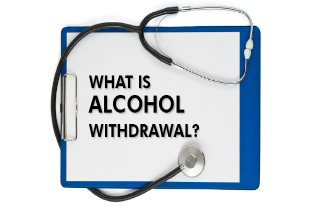What is alcohol withdrawal syndrome?
Maybe you’re wondering, “Am I addicted to alcohol?” or, “What will happen if I stop drinking?”
Alcohol withdrawal syndrome is characterized by symptoms that occur following a prolonged use of alcohol. Specifically, developing a tolerance and dependence on alcohol will cause alcohol withdrawal symptoms to occur when use of alcohol ends. Why does this happen and how does alcohol work in the body? Alcohol alters the release of neurotransmitters from nerve cells, disrupting the function of receptor proteins. Following prolonged use of alcohol, the brain attempts to function normally under the altered affects, building a tolerance. Following termination of alcohol use, your brain is then forced to function without alcohol, causing “rebound symptoms, also known as alcohol withdrawal syndrome.
What is withdrawal from alcohol like?
Alcohol withdrawal is like getting really sick with a cold or flu. You can also expect to see some of the symptoms that resemble the flu, such as clammy skin, headache, loss of appetite, nausea and vomiting and sweating. Because alcohol withdrawal is both physical and psychological, the severity of symptoms will depend on how much you’ve been drinking in the past and for how long. In some severe cases of alcohol withdrawal, delirium tremens can occur, causing agitation, severe confusion, hallucinations, fever and seizures.
During withdrawal from alcohol, your body will go through changes as it adjusts to functioning without alcohol, which will cause the physical withdrawal symptoms. Your brain will also undergo changes, as we mentioned in the previous paragraph, which will cause psychological symptoms. Alcohol withdrawal symptoms you may experience include:
- anxiety or nervousness
- depression
- fatigue
- irritability
- jumpiness or shakiness
- mood swings
- nightmares
- not thinking clearly
What does alcohol withdrawal feel like?
During alcohol withdrawal, you will experience physical, psychological and emotional symptoms. Physically, you will feel fatigued with flu-like symptoms. Emotionally and psychologically, you will face anxious thoughts and irritability. You may have difficulty sleeping and go through mood swings.
Symptoms of alcohol withdrawal usually begin 5-10 hours following the last drink and usually intensify after 48-72 hours. Withdrawal symptoms last between 5-10 days, however in extreme cases symptoms can last for several weeks.
What helps alcohol withdrawal?
The main treatment that helps alcohol withdrawal is medical supervision. You should always tell a doctor when you want to stop drinking and ask for advice, counsel, and medical support. If you choose to withdrawal from home, it is important to ensure that you are in a safe environment. You should surround yourself with people who you trust, and will support your abstinence from alcohol. Remaining in a situation where there is pressure to use alcohol will make the withdrawal process difficult, and may cause relapse. Specific medical helps for alcohol withdrawal include:
Detox – Alcohol detoxification manages acute intoxication and withdrawal. The main goal of detox is to clear the toxins from your body, and to minimize the physical harm that is caused by the abuse of substances. It is recommended that you enter voluntary supervised medical withdrawal, which can be achieved in a facility or in an outpatient treatment program. Undergoing this form of medical help for alcohol withdrawal allows you to be evaluated, stabilized and assisted in further treatment options. It is important to note that detox is not a cure to alcohol dependence, and it is necessary to seek further treatment for psychological alcohol withdrawal symptoms.
Home remedies that help alcohol withdrawal – When considering home remedies for alcohol withdrawal, get medical clearance first. You can treat most symptoms similarly to the way you would treat flu symptoms. If you choose to withdraw from alcohol at home, address psychological withdrawal symptoms. You can do this by attending Alcoholics Anonymous or SMART recovery meetings in your area.
Medications for alcohol withdrawal – In most cases, medications are not prescribed during alcohol withdrawal. However, there are drugs available for severe cases of withdrawal. Benzodiazepines are considered the drug of choice for alcohol withdrawal. These are anti-anxiety medications that inhibit nerve-cell excitability and relieve withdrawal symptoms, help prevent progression to delirium tremens and reduce the risk of seizures. However, acute withdrawal symptoms are usually treated with supportive care. Anti-drinking medications like acamprosate, disulfiram, and naltrexone may also be prescribed to prevent relapse drinking.
Tapering – Tapering off alcohol is not a suggested method of alcohol detox.
Let’s verify your coverage for treatment at an American Addiction Centers location. Your information is kept 100% confidential.
Questions about alcohol withdrawal
Are you unsure about alcohol withdrawal and would like more information? Do you have information or expertise to share on the subject? Please leave a comment below and we will answer your question personally and promptly.









Related Posts